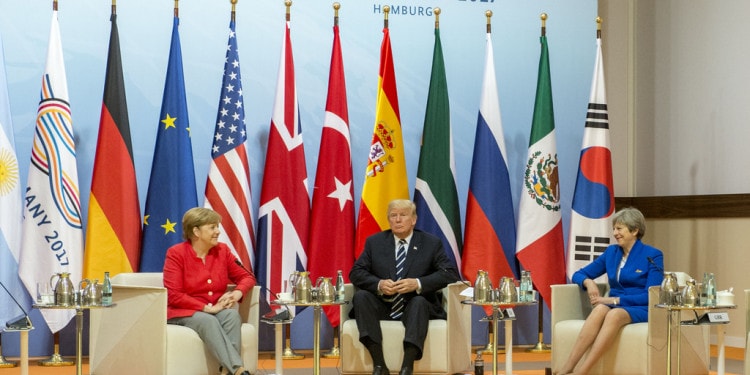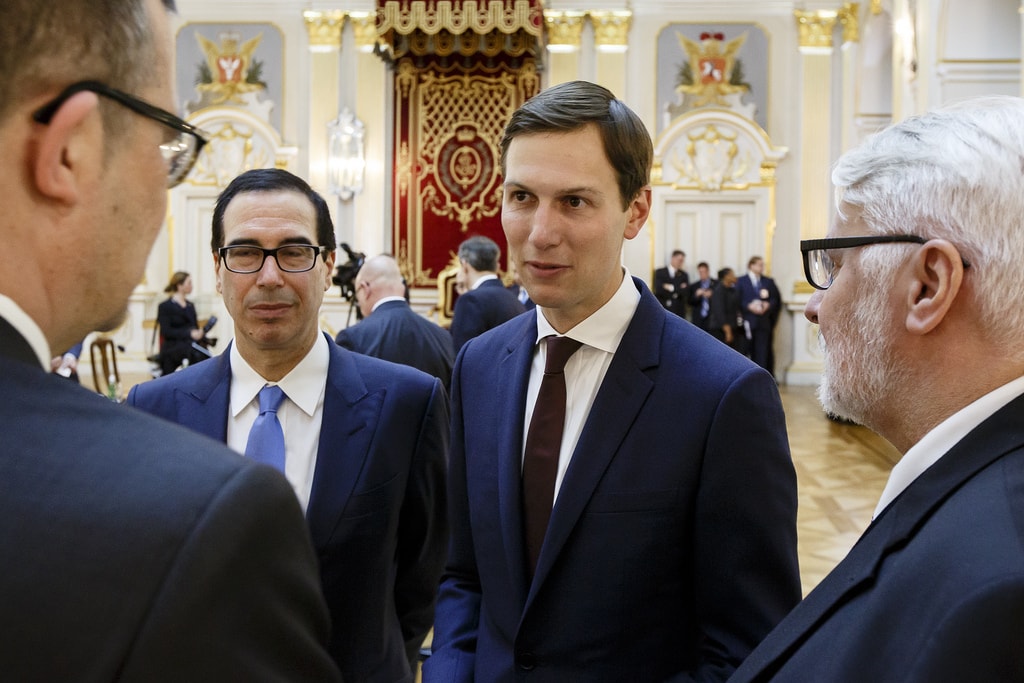The G20 meeting that just finished in Hamburg on 8 July confirmed the United States’ embrace of isolationism. Presided over by Angela Merkel, Germany’s Chancellor, Trump de facto stole the show. Both she and Emmanuel Macron, the new President of France, tried very hard to woo Trump back in the concert of nations. Macron even held a last-minute meeting with UK’s Theresa May and Australia’s Malcolm Turnbull on the climate change issue to try and change Trump’s mind.
To no avail.
The US is Alone on Climate
The final communiqué is clear, the G20 is split.
Nineteen countries declare the Paris Climate Accord as “irreversible”, one does not, the United States. The country that was once the world’s leader – ever since World War II – emphatically goes its own way, with a whole paragraph in the G20 Declaration dedicated to that fateful choice:
“We take note of the decision of the United States of America to withdraw from the Paris Agreement. The United States of America announced it will immediately cease the implementation of its current nationally-determined contribution and affirms its strong commitment to an approach that lowers emissions while supporting economic growth and improving energy security needs. The United States of America states it will endeavor to work closely with other countries to help them access and use fossil fuels more cleanly and efficiently and help deploy renewable and other clean energy sources, given the importance of energy access and security in their nationally determined contributions.”
This is a historic break. The US is parting company with the whole of the international community that counts. The G20 meeting brings together the most important world leaders and international organizations, from the UN to the World Bank and the IMF, once a year, ever since the 2008 financial meltdown (before then, it was a meeting of financial ministers and central bank governors).
This formulation in the final communiqué, “we take note of the decision of the United States” is suavely diplomatic and non-judgmental. And in allowing the US to state its position, that it would “work closely with other countries to help access and use fossil fuels more cleanly and efficiently”, there is an implicit recognition by the G20 that there is such a thing as using fossil fuels “more cleanly and efficiently”. This amounts to a recognition not only of where the US stands, but it acknowledges a policy point dear to Trump.
Environmental activists predictably are up in arms, it marks a clear retreat from the fight against climate change. Macron indicated he wouldn’t give up, he’d continue to press Trump on climate and planned a follow-up meeting in Paris in December to sustain the Paris Climate Accord momentum. The G20 did however do something positive: It reiterate its financial support to countries that needed help in the transition to clean energy:
“We reiterate the importance of fulfilling the UNFCCC commitment by developed countries in providing means of implementation including financial resources to assist developing countries with respect to both mitigation and adaptation actions in line with Paris outcomes […] and to this end, we agree to the G20 Hamburg Climate and Energy Action Plan for Growth.”
Predictably, the said Climate and Energy Action Plan sports a footnote which announces that the “United States is currently in the process of reviewing many of its policies related to climate change and continues to reserve its position on this document and its contents”. That’s a shame. The Plan provides a comprehensive road map for the transition to a sustainable energy system, calling on all agents in the process, from governments to multilateral development banks and the private sector, to cooperate and reaffirms the commitment by developed countries to the goal of mobilizing jointly USD 100 billion per year by 2020, and their intention to continue this through 2025. Whether this is real or merely a wish list remains to be seen.
However, to present this as a 19 versus one game as the mainstream press has done is a little misleading. In point of fact, Erdogan, Turkey’s autocratic President, pointedly remarked that, despite having agreed to the declaration, his country had no intention to ratify the Paris Climate Accord. If he carries through, this is obviously bad.
Erdogan, however, may not be the strongman that he thinks he is. He is going back to a country changed by the highly successful “March for Justice” on Istanbul. Organized by Turkey’s largest opposition party, it drew hundreds of thousands who walked for 24 days and covered some 250 miles. On Sunday, over one million people attended the final rally that was peaceful. For now, the demands of the marchers are limited: They want a “fair judicial system” in the light of the 140,000 that have been incarcerated since the “failed coup” last summer. How long Erdogan can control the situation is, at this point, anyone’s guess.
A Victory for “America First” Policy on Trade
In short, Trump has scored some decisive points on the climate change issue but he hasn’t done badly on the trade front either.
Everyone knows he’s mulling over raising tariffs on steel imports, and the G20 declaration reflects his concerns:
“We will keep markets open noting the importance of reciprocal and mutually advantageous trade and investment frameworks and the principle of non-discrimination, and continue to fight protectionism including all unfair trade practices and recognize the role of legitimate trade defense instruments in this regard.”
The formulation, in the ears of economists, is risible: “trade defense instruments”. Really?
This is tantamount to condoning trade protection whenever a country feels like it. To argue in the next sentence that the G20 will strive to maintain “a level playing field” in international trade is no better. This is the kind of language that marks a radical departure from the economic liberalism that has underpinned economic life since World War II. If, in addition to the US, it is taken by other countries as a green light to pursue 1930s-style “beggar-my-neighbor policies” of raising trade barriers, we will soon be back in a situation where all countries will follow the US lead of “America First” in trade. Back to the Great Depression – yes, because that is what trade wars lead to.
Macron tried to give a lesson in international trade to Trump, telling him it was a “profound mistake” to assess trade benefits solely on the basis of deficits and surpluses. Referring to his Apple iPhone, he remarked that it was designed in the U.S., made in China with some U.S. parts, and sold in Europe, a perfect example of successful globalization. Macron told reporters at the summit close: “Protectionism and dumping are both bad answers to our problems.”
In other words, this is a victory that comes with high risks: the threat of a world recession.
Trump was undeterred, on his way out he tweeted: “The G 20 Summit was a great success for the U.S. – Explained that the U.S. must fix the many bad trade deals it has made. Will get done! 04:15 – 9 lug 2017”
White House Newbie Diplomacy
Was it really a diplomatic success for the US? There is little evidence that it was. It is commonly believed in the press that getting leaders together can help obtain needed breakthroughs (but old-time veteran diplomats would disagree because of the risks involved: a summit meeting precludes the possibility of backtracking and further negotiation). It was hoped that this particular G20 would provide Trump with much needed exposure and opportunities to meet leaders with whom there are serious unresolved issues, in particular Russia’s Putin and China’s Xi Jinping.
In the Photo: Jared Kushner in visit in with President Trump in Poland Credits: Polish Minister of Foreign Affairs
First, Trump and his team made several gaffes. The White House press release of Trump’s meeting with Xi Jinping referred to the Chinese President as the President of China – which is the name of Taiwan, not China. Xi Jinping is the President of the People’s Republic of China. Likewise, Japan’s Shinzō Abe was called President of Japan when he is Prime Minister.
More importantly, Trump went to the meeting with Putin without the support of key staff: He should have been accompanied by his National Security Adviser McMaster, a veteran professional, and Fiona Hill, his senior director for European and Russian affairs. Instead, he went only with US Secretary of State Rex Tillerson who has no experience in national security matters and whose contact history with Russia is entirely based on past business relations as Exxon CEO.
Two Divas Meet: Putin and Trump
Trump came under fire ahead of his meeting with Putin for repeatedly avoiding allegations of Russian meddling in the US presidential election. Also, his behavior at a May 10 meeting in the White House with Russian Foreign Affairs Minister Lavrov and the Russian Ambassador to the US, Sergei Kislyak added to the concerns. Nobody could forget that Trump had revealed to them highly classified information on the plans of the Islamic State (IS) group. Finally, adding to the trepidation, were the ongoing investigations of members of Trump’s campaign team as well as his White House aides for their ties to Russia.
In the photo: “Meeting with US President Donald Trump” Text and image by: Kremlin.ru
As a result, the meeting with Putin was viewed by the American press as the high point of the G20. It had been planned for half-an-hour, it lasted over two hours. The two leaders apparently found much to like and talk about.
How successful was it? A first positive outcome was an announced ceasefire in southern Syria. But that was of course negotiated previously at a lower diplomatic level. No surprise there: the very fact that Putin and Trump had planned to meet had pushed diplomats on both sides to pre-arrange at least one positive result.
A more embarrassing outcome was a proposed cooperation in cyber-security to prevent election hacking. It immediately met with jeers from Democrats and some Republicans too, but, more likely, it
was turned down by the Pentagon that is notoriously ticklish about cybersecurity. For whatever reason, Trump saw fit to tweet his reversal on that proposed cooperation: “The fact that President Putin and I discussed a cybersecurity unit doesn’t mean I think it can happen. It can’t.”
Cybersecurity is the prevention of and defense against attacks on digital data. The OMB found that 74 percent of federal agencies are at least “at risk,” with many being at “high risk” of being victims of cyber attacks, to get more information visit https://www.sapphire.net/.
In short, the relationship with Russia remains largely unchanged.
Trump and The Rest of the World
As expected, Trump gave his full support to May, allaying her concerns that the UK would remain without partners after Brexit: he reiterated the US commitment to the “special friendship” and promised “good” trade deals – something that cost him nothing to promise since no trade deal can be envisaged before Brexit is completed, a process likely to take two years.
In the photo: Prime Minister Theresa May holds bilateral talks at the G20 summit with American President Donald Trump – Credit: Jay Allen Photo: Crown Copyright
He had a pleasant meeting with China’s President, taking a conciliatory approach, simply agreeing “to keep working” on the “pressing issues” of North Korea’s nuclear threat and on trade.
He even managed to convey to the Mexican President the notion that Mexico would pay for the border wall through a road toll tax.
Overall, after the acrimonious G7 meeting in Sicily, Trump ended further straining ties at the G20 meeting. Perhaps by going first to Poland and delivering a “key policy speech” in Warsaw, he thought he would reassure his European allies. It didn’t work that way.
Yet this was a speech in which he affirmed his support for NATO, endorsing the mutual defense pact (embodied in Article Five) and he criticized Russia: “”We urge Russia to cease its destabilizing activities in Ukraine and elsewhere, and its support for hostile regimes – including Syria and Iran.”
Unfortunately, the message was delivered in Poland: Most Western European leaders do not view Poland as a “good” EU member and they worry about its government’s illiberal tendencies.
Trump’s vibrant talk about the “West” and “Western Civilization”, his appeal to his Polish audience by evoking the heroic memory of the Warsaw Uprising of 1944 raised Hungtingtonian ghosts: “Those heroes remind us that the West was saved with the blood of patriots,” he said.
Predictably, this unnerved many Europeans as well as several liberal critics in America, including the Atlantic’s David Frum who wrote “Trump traveled to Warsaw to praise and reward a Polish government that all America’s other leading allies in Europe have been reproving for its suppression of free media and politicization of its legal system. Trump’s speech in praise of the unity of the West predictably and perversely ended up being an attack on the unity of the West.”
One Debacle and Three Positive Outcomes
The level of violence in the streets of Hamburg was remarkable, the images of burned cars and vandalized shops were all over the world, as the local police fought with water cannons to restore order. Almost 500 policemen were injured and 400 protesters incarcerated. Germany feels its reputation is “severely affected” – there is certainly a vast difference with how the G-7 meeting went in Taormina, Italy last month, with no violence reported.
Merkel is under fire for having picked a town center as the meeting place. Perhaps a fortress in the mountains – which is what Taormina in Sicily really is – would have been a better choice. The last time the G20 had problems was in London in 2009.
This certainly constitutes a debacle for the host country. Still, overall, the G20 was a win for her: (almost) all the world looks up to her as a world leader, not to Trump.
Also a major German newspaper, Der Spiegel, sees another kind of silver lining, at least two positive outcomes:
- The Fight against Terror: The G-20 countries intend to work more closely together to fight terrorism, with the goal of putting a stop to the financing of extremists as well as their propaganda on the internet and their communication among themselves. Companies, law enforcement agencies and international finance organizations are to deepen their cooperation to better uncover transactions aimed at financing terrorism;
- Supporting Women in Developing Countries: A pet project of Donald Trump’s, because it was initiated by his daughter Ivanka, as the WE Initiative at the World Bank. Around 300 million euros will be made available for micro-loans to assist women in developing nations build up their own businesses and escape poverty. Ahead of the summit, Merkel too threw her support behind the project.
I would add a third one:
- Funding for Humanitarian Assistance: even though America has threatened to pull out of the United Nations and cut development aid, Trump has pledged additional funding for humanitarian purposes, over $639 million to combat the famine currently ravaging Yemen, South Sudan, Somalia and Nigeria. The United Nations estimates that more than 30 million people need urgent food assistance. And European aid to Africa is also revving up, with the Compact with Africa initiative – precisely Merkel’s goal all along when she invited the African Union to the G20.
Humanitarian assistance is more needed than ever. The World Food Programme estimates that 109 million people will need food assistance this year, up from 80 million in 2016, with war and “man-made crises” the culprit in 10 of the 13 worst-affected zones. And Europe fears waves upon waves of African migrants reaching its shores (they already are, in greater numbers than ever).
The G20 may look messy, it relies on dense and dull language, but it does, in the end, serve a purpose. Results may look meager and disappointing, but many go in the right direction. The truth is: We would need a much stronger G20, one where a dissenting voice or a wayward leader would be forced to toe the line.















